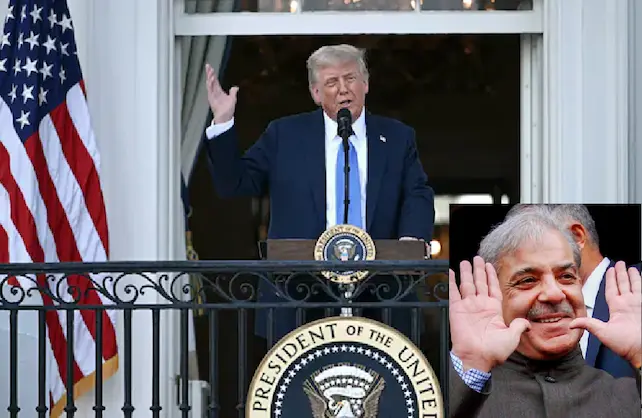
Trump’s travel ban targets multiple nations but spares Pakistan. Experts suggest financial interests and Deep State influence
The Deep State Theory – U.S. President Donald Trump has once again ignited controversy with his latest travel ban, targeting multiple nations under the guise of national security concerns. The move, which restricts entry from several countries deemed high-risk, has sparked global debate. However, what has raised the most eyebrows is Pakistan’s exemption from the list, a country that has long been accused of harboring terrorist networks and playing a double game in global geopolitics.
Trump’s relationship with Pakistan has historically been volatile, swinging between harsh criticism and diplomatic overtures. His first term saw him cut aid, impose visa sanctions, and publicly accuse Pakistan of hiding Osama bin Laden. Yet, in a stunning reversal, Pakistan has now been spared from the latest travel restrictions. This shift has led analysts to question whether financial interests, intelligence operations, or geopolitical maneuvering played a role in Pakistan’s exemption.
Trump’s Travel Ban: The Controversy Unfolds
The new travel ban is being framed as a national security measure, aimed at preventing terrorism and illegal immigration. Trump’s administration has justified the move by citing visa overstays, lack of proper screening, and security risks associated with certain nations.
However, critics argue that the ban is selective, targeting some nations while sparing others based on political convenience rather than actual security threats. The exclusion of Pakistan from the list has fueled speculation about Trump’s motivations, with many questioning whether business interests or intelligence deals influenced the decision.
Why Was Pakistan Spared?
1. Deep State Influence & Strategic Interests
Indian geostrategist Brahma Chellaney suggests that Trump’s decision aligns with U.S. intelligence interests, often referred to as the Deep State approach.
- The U.S. has historically maintained complex relations with Pakistan, balancing security concerns with geopolitical strategy.
- Pakistan’s role in Afghanistan and counterterrorism operations may have influenced the decision.
- The CIA and Pentagon have long viewed Pakistan as a necessary ally, despite its controversial ties to extremist groups.
2. Financial & Business Ties
Reports indicate that Trump-linked interests have a stake in World Liberty Financial (WLF), a cryptocurrency firm that recently signed a deal with Pakistan.
- The company’s website openly displays “Inspired by Donald J Trump”, and is reportedly co-owned by his sons, Eric and Donald Jr., along with Jared Kushner.
- This financial connection raises questions about Trump’s motivations behind Pakistan’s exemption.
- Some analysts believe that Trump’s business empire may have vested interests in maintaining favorable relations with Pakistan.
3. Pakistan’s Role in U.S. Foreign Policy
Despite past tensions, Trump has previously sought to reset relations with Pakistan, including offering to mediate the Kashmir dispute in 2019.
- The U.S. may view Pakistan as a key player in regional stability, particularly concerning Afghanistan and counterterrorism efforts.
- Trump’s shift in stance could be part of a larger diplomatic strategy.
- Pakistan’s recent cooperation in extraditing a top terrorist may have played a role in Trump’s softened stance.
Contradictions in Trump’s Policy
Trump’s earlier stance on Pakistan was harsh, with his first tweet of 2018 accusing Pakistan of “lies & deceit” and cutting $800 million in aid.
- In August 2018, the U.S. military canceled $300 million in aid to Pakistan, citing lack of action against militants.
- In November 2018, Trump accused Pakistan of helping to hide Osama bin Laden, stating, “Everybody in Pakistan knew he was there”.
- In April 2019, the Trump administration imposed visa sanctions on Pakistan under Section 243(d) of the Immigration and Nationality Act (INA).
However, his recent exemption of Pakistan from the travel ban suggests a shift in priorities, possibly influenced by business interests and diplomatic strategy.
Political & Geopolitical Implications
Impact on U.S.-India Relations
India has long accused Pakistan of harboring terrorists, and Trump’s decision to spare Pakistan could strain U.S.-India relations.
- Indian officials have expressed concern over the U.S.’s inconsistent stance on Pakistan.
- Some analysts believe that Trump’s decision reflects a larger geopolitical game involving China, Pakistan, and the U.S..
- The Biden administration may reverse Trump’s decision if it sees Pakistan as a security threat.
Pakistan’s Reaction
Pakistan’s government has welcomed the decision, stating that it reflects “strong diplomatic ties” between the two nations.
- Pakistani officials have emphasized their commitment to counterterrorism efforts.
- Some critics argue that Pakistan’s exemption is politically motivated rather than based on security assessments.
Conclusion – The Deep State Theory
While Trump’s decision to exclude Pakistan from the travel ban has raised eyebrows, it appears to be driven by a mix of strategic, financial, and geopolitical factors. Whether this marks a long-term shift in U.S.-Pakistan relations or a temporary political maneuver remains to be seen. As the global political landscape evolves, Trump’s stance on Pakistan could have far-reaching consequences for U.S. foreign policy, India-Pakistan relations, and counterterrorism efforts.
1 thought on “Trump’s Travel Ban: Why Pakistan Was Spared & The Deep State Theory Behind It”